实用综合教程教案Unit
- 格式:doc
- 大小:36.00 KB
- 文档页数:5
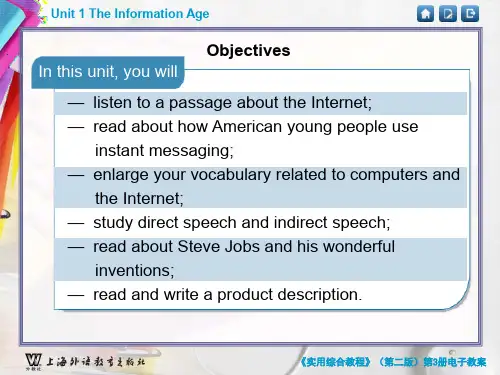
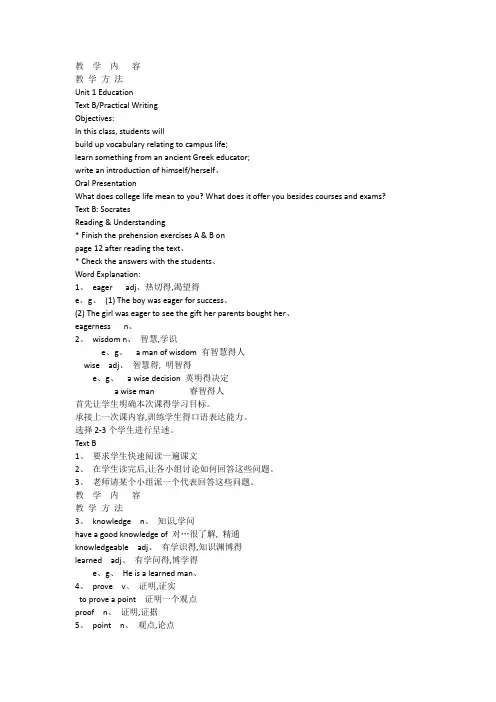
教学内容教学方法Unit 1 EducationText B/Practical WritingObjectives:In this class, students willbuild up vocabulary relating to campus life;learn something from an ancient Greek educator;write an introduction of himself/herself、Oral PresentationWhat does college life mean to you? What does it offer you besides courses and exams? Text B: SocratesReading & Understanding* Finish the prehension exercises A & B onpage 12 after reading the text、* Check the answers with the students、Word Explanation:1、eager adj、热切得,渴望得e、g、(1) The boy was eager for success、(2) The girl was eager to see the gift her parents bought her、eagerness n、2、wisdom n、智慧,学识e、g、 a man of wisdom 有智慧得人wise adj、智慧得, 明智得e、g、 a wise decision 英明得决定a wise man 睿智得人首先让学生明确本次课得学习目标。
承接上一次课内容,训练学生得口语表达能力。
选择2-3个学生进行呈述。
Text B1、要求学生快速阅读一遍课文2、在学生读完后,让各小组讨论如何回答这些问题。
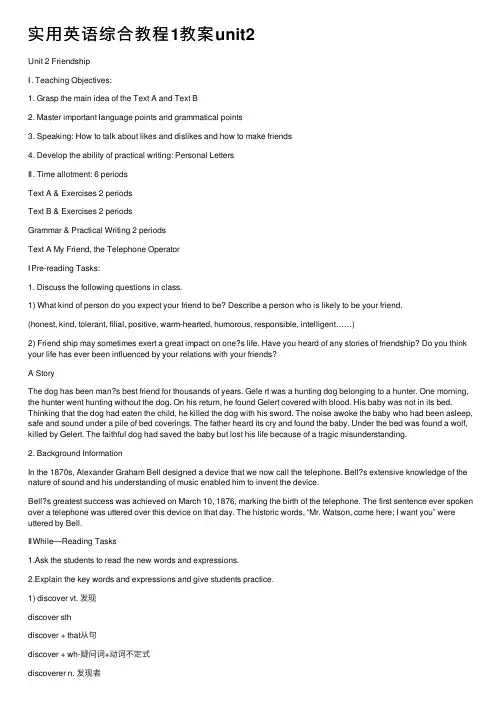
实⽤英语综合教程1教案unit2Unit 2 FriendshipⅠ. Teaching Objectives:1. Grasp the main idea of the Text A and Text B2. Master important language points and grammatical points3. Speaking: How to talk about likes and dislikes and how to make friends4. Develop the ability of practical writing: Personal LettersⅡ. Time allotment: 6 periodsText A & Exercises 2 periodsText B & Exercises 2 periodsGrammar & Practical Writing 2 periodsText A My Friend, the Telephone OperatorⅠPre-reading Tasks:1. Discuss the following questions in class.1) What kind of person do you expect your friend to be? Describe a person who is likely to be your friend.(honest, kind, tolerant, filial, positive, warm-hearted, humorous, responsible, intelligent……)2) Friend ship may sometimes exert a great impact on one?s life. Have you heard of any stories of friendship? Do you think your life has ever been influenced by your relations with your friends?A StoryThe dog has been man?s best friend for thousands of years. Gele rt was a hunting dog belonging to a hunter. One morning, the hunter went hunting without the dog. On his return, he found Gelert covered with blood. His baby was not in its bed. Thinking that the dog had eaten the child, he killed the dog with his sword. The noise awoke the baby who had been asleep, safe and sound under a pile of bed coverings. The father heard its cry and found the baby. Under the bed was found a wolf, killed by Gelert. The faithful dog had saved the baby but lost his life because of a tragic misunderstanding.2. Background InformationIn the 1870s, Alexander Graham Bell designed a device that we now call the telephone. Bell?s extensive knowledge of the nature of sound and his understanding of music enabled him to invent the device.Bell?s greatest success was achieved on March 10, 1876, marking the birth of the telephone. The first sentence ever spoken over a telephone was uttered over this device on that day. The historic words, “Mr. Watson, come here; I want you” were uttered by Bell.ⅡWhile—Reading Tasks1.Ask the students to read the new words and expressions.2.Explain the key words and expressions and give students practice.1) discover vt. 发现discover sthdiscover + that从句discover + wh-疑问词+动词不定式discoverer n. 发现者discovery n. 发现discover & learn两个词都含有“获得知识,了解”这个含义。
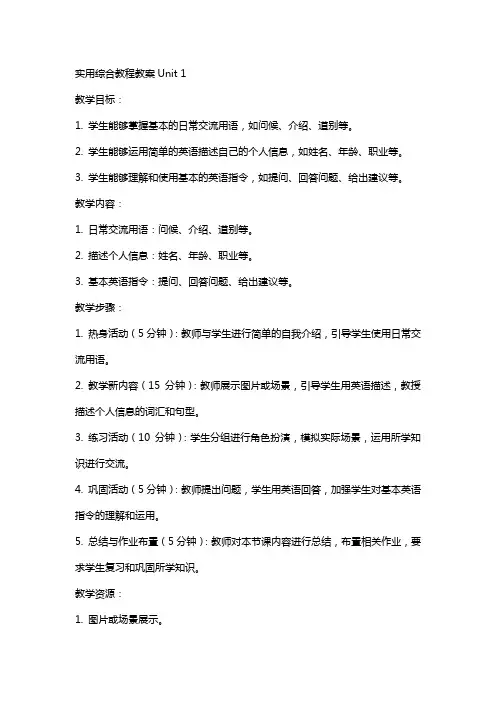
实用综合教程教案Unit 1教学目标:1. 学生能够掌握基本的日常交流用语,如问候、介绍、道别等。
2. 学生能够运用简单的英语描述自己的个人信息,如姓名、年龄、职业等。
3. 学生能够理解和使用基本的英语指令,如提问、回答问题、给出建议等。
教学内容:1. 日常交流用语:问候、介绍、道别等。
2. 描述个人信息:姓名、年龄、职业等。
3. 基本英语指令:提问、回答问题、给出建议等。
教学步骤:1. 热身活动(5分钟):教师与学生进行简单的自我介绍,引导学生使用日常交流用语。
2. 教学新内容(15分钟):教师展示图片或场景,引导学生用英语描述,教授描述个人信息的词汇和句型。
3. 练习活动(10分钟):学生分组进行角色扮演,模拟实际场景,运用所学知识进行交流。
4. 巩固活动(5分钟):教师提出问题,学生用英语回答,加强学生对基本英语指令的理解和运用。
5. 总结与作业布置(5分钟):教师对本节课内容进行总结,布置相关作业,要求学生复习和巩固所学知识。
教学资源:1. 图片或场景展示。
2. 角色扮演道具。
教学评估:1. 观察学生在角色扮演中的表现,评估其对日常交流用语的掌握程度。
2. 收集学生的作业,评估其对描述个人信息和基本英语指令的运用能力。
实用综合教程教案Unit 2教学目标:1. 学生能够理解和使用简单的英语进行购物交流,如询问价格、挑选商品、付款等。
2. 学生能够运用英语描述商品的特点和需求,如颜色、大小、数量等。
3. 学生能够掌握基本的购物常用词汇,如商品名称、价格、付款方式等。
教学内容:1. 购物交流用语:询问价格、挑选商品、付款等。
2. 描述商品特点和需求:颜色、大小、数量等。
3. 购物常用词汇:商品名称、价格、付款方式等。
教学步骤:1. 热身活动(5分钟):教师模拟购物场景,引导学生使用购物交流用语。
2. 教学新内容(15分钟):教师展示商品图片或实物,引导学生用英语描述商品特点和需求,教授购物常用词汇和句型。
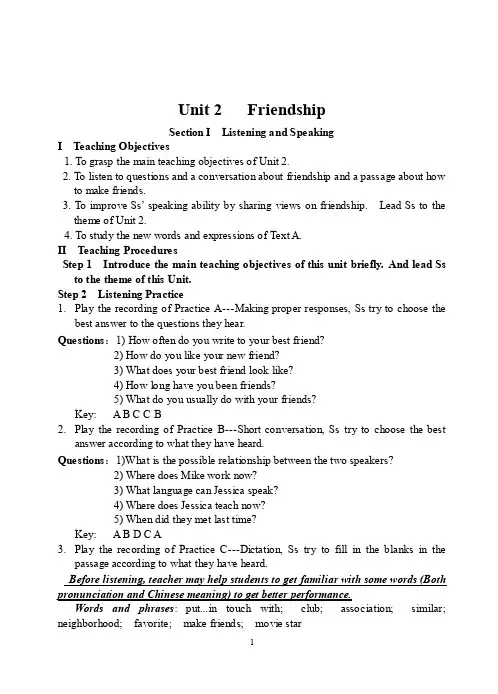
Unit 2 FriendshipSection I Listening and SpeakingI Teaching Objectives1. To grasp the main teaching objectives of Unit2.2. To listen to questions and a conversation about friendship and a passage about howto make friends.3. To improve Ss’ speaking ability by sharing views on friendship. Lead Ss to thetheme of Unit 2.4. To study the new words and expressions of Text A.II Teaching ProceduresStep 1 Introduce the main teaching objectives of this unit briefly. And lead Ss to the theme of this Unit.Step 2 Listening Practice1.Play the recording of Practice A---Making proper responses, Ss try to choose thebest answer to the questions they hear.Questions:1) How often do you write to your best friend?2) How do you like your new friend?3) What does your best friend look like?4) How long have you been friends?5) What do you usually do with your friends?Key: A B C C B2.Play the recording of Practice B---Short conversation, Ss try to choose the bestanswer according to what they have heard.Questions:1)What is the possible relationship between the two speakers?2) Where does Mike work now?3) What language can Jessica speak?4) Where does Jessica teach now?5) When did they met last time?Key: A B D C A3.Play the recording of Practice C---Dictation, Ss try to fill in the blanks in thepassage according to what they have heard.Before listening, teacher may help students to get familiar with some words (Both pronunciation and Chinese meaning) to get better performance.Words and phrases: put...in touch with; club; association; similar; neighborhood; favorite; make friends; movie starAnd teacher may consider to introduce some English idioms related to friendship to students.Example: A friend in need is a friend indeedA life without a friend is a life without a sun.Key: put, sport, interests, newspaperStep 3 Speaking Practice---Discussion1.Encourage the students to take turn to speak in the discussion in pairs. Andencourage them to have their own ideas.2.Hints for the three questions discussed.1)The easy ways to make friends include:A. joining a club,B. playing a sport,C. planning things to talk about,D. finding out what’s new in the newspaper,E. listening to the top CDs and share your impressions with others,F. learning about what’s new with your favorite TV or movie star.2)Tips for making friends:A. Learn from people at school or work who seem to have lots of friends. Observehow they make and keep friends, but don’t copy them.B. Don’t be afraid to show people what you are really good at. Talk about thethings you like and do best. Don’t hid your strong points.C. Be a good listener.D. Try to make friends with the kind of people your really like, respect, andadmire -- not just with those who are easy to meet.E. Treat your friends as you would like him or her to treat you. Be loyal, caring,and supportive.Step 4 New W ords and Expressions of Text A1.operator n.电话接线员Root: operate v. 操作,运转e.g. Our model is easy to operate and maintain.这个型号的机器很容易操作和保养。
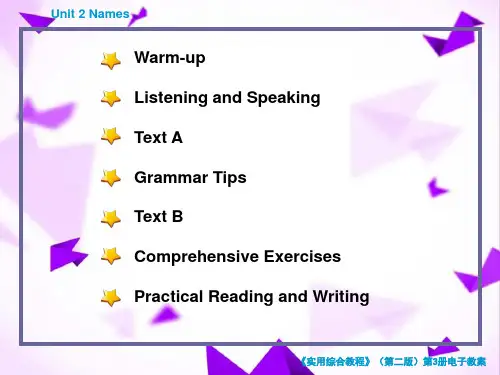
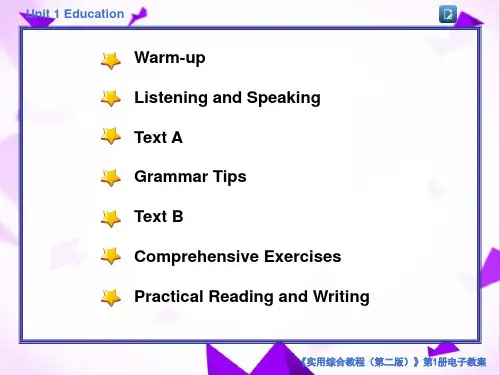


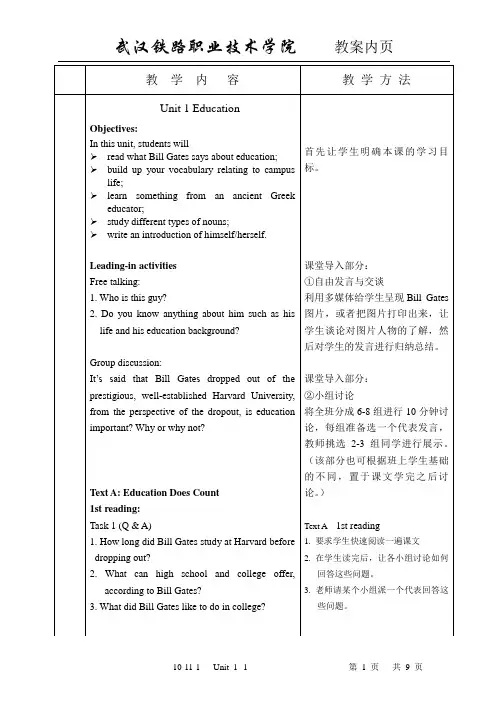

实用综合教程教案Unit 1一、教学目标1. 知识目标:(1)掌握基本的日常交流用语。
(2)学习描述人物、地点和事物的基本词汇。
(3)了解简单的语法结构,如主谓一致、be动词等。
2. 技能目标:(1)能够进行简单的自我介绍。
(2)能够用英语进行简单的问答。
(3)能够运用所学词汇和语法描述人物、地点和事物。
3. 情感目标:(1)培养学生的学习兴趣和自信心。
(2)培养学生积极主动参与课堂活动的习惯。
二、教学内容1. 词汇:介绍基本的日常交流用语,如hello、good morning、good afternoon、good evening、how are you等。
2. 语法:学习主谓一致和be动词的用法,如I am、you are、he is、she is、it is等。
3. 对话:编写或引入简单的自我介绍和问答对话。
三、教学方法1. 任务型教学法:通过小组活动、角色扮演等形式,让学生在实际操作中运用所学知识。
2. 交际法:通过模拟真实场景,让学生在实际交流中提高英语水平。
3. 游戏教学法:通过趣味性游戏,激发学生的学习兴趣。
四、教学步骤1. 热身活动(5分钟):引导学生进行简单的英语问候,如hello、good morning 等。
2. 词汇学习(10分钟):教授基本的日常交流用语,让学生跟读并模仿。
3. 语法讲解(10分钟):讲解主谓一致和be动词的用法,举例说明。
4. 对话练习(10分钟):分组进行角色扮演,让学生模拟自我介绍和问答对话。
5. 课堂活动(10分钟):组织学生进行小组活动,如用所学词汇和语法描述人物、地点和事物。
五、教学评价1. 课堂参与度:观察学生在课堂活动中的表现,如积极参与、主动提问等。
2. 对话练习:评估学生在角色扮演中的语言表达能力和交际能力。
3. 作业完成情况:检查学生对课堂所学内容的掌握程度。
实用综合教程教案Unit 2【待补充】六、教学内容1. 词汇:学习描述人物、地点和事物的形容词,如pretty、tall、short、big、small等。
实用综合教程教案Unit 1-5教案编写日期:2024年10月教案编辑专员:一、教学目标1.1 知识目标学生能够掌握日常生活中常用的单词和短语。
学生能够理解并运用简单的语法结构进行日常交流。
1.2 技能目标学生能够听懂并能够使用日常会话中的基本句型。
学生能够在适当的语境中正确使用所学的单词和短语。
1.3 情感目标培养学生对英语学习的兴趣,增强学习动力。
培养学生勇于开口表达的信心和勇气。
二、教学内容2.1 主题内容本单元主要围绕日常生活中的人际交往展开,包括介绍自己、询问他人信息、表达喜好等场景。
2.2 语言点本单元重点学习一般现在时态的肯定句和疑问句。
本单元学习常用的日常会话句型,如:How are you? I'm fine, thank you. What's your name? My name is等。
三、教学方法3.1 情境教学法通过设置各种生活情境,让学生在实际语境中学习和使用英语。
3.2 交际法鼓励学生进行角色扮演,进行实际的语言交流。
3.3 任务型教学法通过完成各种小组任务,培养学生的合作精神和语言运用能力。
四、教学步骤4.1 热身活动(5分钟)教师与学生进行简单的英语问候,营造轻松的课堂氛围。
4.2 新课导入(10分钟)教师通过图片、实物等展示本节课的主题,引入新词汇和句型。
4.3 课堂讲解(15分钟)教师讲解本节课的重点词汇和句型,让学生进行实际操作练习。
4.4 小组活动(15分钟)学生分组进行角色扮演,运用所学词汇和句型进行实际交流。
4.5 总结与作业布置(5分钟)教师对本节课的内容进行总结,布置相关作业,巩固所学知识。
五、教学评价5.1 课堂参与度观察学生在课堂上的积极参与程度,以及对课堂活动的兴趣。
5.2 语言运用能力评估学生在角色扮演等实际交流活动中的语言运用能力。
5.3 作业完成情况检查学生作业的完成质量,以巩固所学知识。
六、教学资源6.1 教材:实用综合教程教材6.2 辅助材料:多媒体课件、图片、实物等6.3 教学工具:投影仪、计算机、黑板等七、教学评估7.1 形成性评估教师在教学过程中观察学生的学习情况,及时进行反馈和指导。
实用综合教程(第二版)外教社-第1册教案第一篇:实用综合教程(第二版)外教社-第1册教案《实用综合教程1》教案An Integrated Skills Course 1 Unit1 Unit2 Unit3 Unit4 Unit5 Unit6 Unit 7 Unit 8ContentsEducation (2)Friendship (8)Gifts (12)Movies..........................................................................18 Our Earth......................................................................22 Part-time Jobs (30)Health (36)Festival (48)《实用综合教程1》教案Unit1 EducationObjectives 1.Read what Bill Gates says about education;2.Build up your vocabulary relating to campus life;3.Learn something from an ancient Greek educator;4.Study different types of nouns;5.Write an introduction of yourself.Focuses 1.Build up your vocabulary relating to campus life;2.Write an introduction of yourself.Outline 1.Warm-up Discussion;study of words and expressions in Text A;Vocabulary Check(B and C)2.Discussion of Text A and the follow-up exercises(A and B)3.Active Words and Vocabulary Check;Grammar Tips 4.Discussion of Text B and the follow-up exercises prehensive Exercises(Ask the students to do the translation exercises outside of the class beforehand)6.Practical WritingProcedures: Classroom Activities I.Warm-up discussion Question: Do you know anything about Bill Gates such as his life and his educational background? Hint 1)birthday and birthplace: October 28, 1995;Seattle, Washington 2)educational background: Harvard University(education not completed)3)career: chairmen and chief software architect of Microsoft, the word‘s largest and most profitable software company.4)main events in his life:a.beginning programming computers at age 13;b.developing a version of the programming language BASIC for the first microcomputer in Harvard;c.founding Microsoft Corporation in 1975 at the age of 19II.Vocabulary in Text A cation n.教育e.g.Children in poor areas receive free cate v.教育;教导educated adj.受教育的 e.g.a well-educated man educator n.教育家,教育者 2.count v.派用场,点数《实用综合教程1》教案e.g.1)Every seconds counts.2)What counts more is whether you have tried your best.3)to count from 1 to 1004)Count these apples.3.advantage n.有利条件,好处;优点,优势e.g.This product has many advantages.advantageous adj.有利的,有益的,便利的 e.g.It is highly advantageous to us.Phrase: take advantage of 很好的使用;利用e.g.take advantage of all educational opportunitiesAntonym: disadvantage n.不利;不利条件e.g.His bad health is a great disadvantage to him when he looks for work.4.lifetime n.一生,终生e.g.1)a lifetime guarantee2)lifetime membership3)In my father‘s lifetime there have been many changes inthe village.5.part-time adj.& adv.兼职的(地)e.g.1)a part-time job2)He works part-time.full-time adj.全职的 e.g.a full-time housewife 6.programmer n.程序师,编程员program v.编制程序e.g.Please program the computer to do the job instead of doing it manually(手工操作).7.discourage vt.不鼓励;使泄气,使失去信心e.g.His parents discouraged him from joining the air force.discouraged adj.泄气的,失去信心的discouraging adj.使人泄气的,使人失去信心的e.g.1)If you meet difficulty in your study, don‘t be discouraged.2)It is discouraging that I didn‘t know how to solve the problem.Antonym: encourage vt.鼓励e.g.I encouraged her to work hard and to try to pass the examinations.courage n.勇敢,勇气e.g.David showed great courage when he saved the child from the burning house.8.diploma n.文凭,毕业证书e.g.a college diplomadiplomatic adj.外交的,从事外交的e.g.Julia joined the diplomatic service after her graduation from university.9.project n.项目,课题e.g.1)an impossible project2)The professor is directing a research project.Synonym: plan10.highly adv.高度地;非常e.g.1)a highly interesting story《实用综合教程1》教案2)a highly paid jobPhrase: speak/ think highly of 赞扬,对…给予很高评价e.g.The leader speaks / thinks highly of our work.11.focus v.(使)集中;(使)聚焦e.g.1)to focus(one‘s mind)in work2)All eyes focused on the speaker.focus n.(兴趣活动等的)中心,焦点e.g.Because of his strange clothes, he immediately became the focus of attention when he entered the office.12.range n.范围e.g.You have a wide range of choices.range vi.在某范围内变化e.g.The temperature ranges from 10 to 20 degrees.13.attend v.参加,出席e.g.attend schoolattend a lectureattendance n.出席,到场 14.automatically adv.自动地e.g.the machine operates automatically.automatic adj.自动的e.g.We have an automatic washing machine.15.drop out of 退学,不参与,退出e.g.1)He dropped out of school at the age of 10 because his family was too poor to afford the tuition.2)She decided to drop out of the competition because it was not fire.16.chance of a lifetime 千载难逢的良机,一生中唯一的机会e.g.It‘s the chance of a lifetime.You will regret it the rest of your life if you don‘t take it.17.try out 试验,考验e.g.She bought a cookbook and tried out a few new recipes.18.in short 简而言之,总之e.g.In short, you should study hard for a better future.Synonym: in brief/ to sum up/ all in all/ in conclusion nguage Points in Text A1.They want to know what to study, or whether it‟s Ok to drop out of college since that‟s what I did.what to study: This is a wh-word + infinitive structure used as the object, which can be changed into an object clause.Wh-word + infinitive structure canbe used as a subject, an object, or an appositive clause(同位语从句),for example: 1)How to improve their English is often discussed among the students.2)We haven‘t decided when to visit t he place.3)You haven‘t answered my question about where to get these books.it‟s Ok to drop out of college: Here ―it‖is used as a formal subject, and the actual subject is the infinitive structure ―to drop out of college‖.The general pattern is ―It is + adj.+(for/ of + sb.)to《实用综合教程1》教案do sth.‖ More examples: 1)It was very thoughtful of her to come to see me when I was ill.2)It‘s easy for me to see through his trick.that‟s what I did: ―what I did‖here is a predictive clause(表语从句)introduced by ―what‖.It i s always structured in the form of ―subject + be/ look/ remain/ seem + predictive clause‖ and can be introduced by such words as ―that‖(always omitted), and other wh-words, for example: 1)It seems(that)it is going to rain.2)This is why I refused to attend the meeting.2.As I ‟ve said before, nobody should drop out of college unless they believe they face the chance of a lifetime.As I‟ve said before: This is a non-restrictive relative clause(非限制性关系从句)introduced by ―as‖(正如…的那样), which can be placed at the beginning or at the end of the sentence.More examples: 1)As people expected, she was admitted to Beijing University.2)Hundreds of people were killed in the earthquake, as I have learned from the newspaper.unless: is a conjunction for an adverbial clause of condition(条件状语从句), which equals ―if…not…‖(除非).e.g.I won‘t leave unless the rain stops.3.In my company‟s early years, we have a bright part-time programmer who planned to drop out of high school to work.planned to: intend to do sth.计划、打算做某事e.g.I plan to make a trip to Beijing during the summer vocation.who planned to …work: a restrictive relative clause introduced by ―who‖ since its antecedent is a person and serves as the subject in the clause.The relative pronoun ―that‖ can be used here too.More examples: 1)The young man who sits there quietly is my brother.2)I don‘t like people that pry into others‘ private business.4.Having a diploma certainly helps somebody who is looking to us for a job.look to sb./ sth.: to depend on sb.or sth.for help or advice 指望,依赖e.g.We look to you for support.5.High school and college offer you the best chance to learn many things and to do projects with others that teach you about team spirit.that teach you about team spirit: This is a restrictive relative clause introduced by ―that‖, whose antecedent acts as the subject of the clause.Actually the relative clause introduced by ―that‖ can be used to modify both the person or the thing, and the roll of ―that‖ can be either the subject or the object.e.g.He was the only one that I knew t here.I haven‘t been to the place that you have mentioned.6.In high school there was a time when I was highly focused on writing software, but for most of my high school years I had many interests.when …software: This is a relative clause introduced by the relative adverb ―when‖, which acts as the adverbial of time in the clause.e.g.1)There was a time when I completely lost my self-confidence.2)I will never forget those days when we were together.《实用综合教程1》教案7.For me, classroom is not the only place where you can learn.where you can learn: This is a restrictive relative clause introduced by the relative adverb ―where‖, which is used as the adverbial of place in the clause.e.g.1)Do you still remember therestaurant where we had dinner last night?2)This is the place where he stayed his whole life.8.In short, it‟s a real mistake not to take the chance to study a wide range of subjects and to learn to work with other people because education does count.it‟s a real mistake not to take the chance: This is an example of a negative infinitive structure, where ―not‖is placed before an infinitive.e.g.1)We are asked not to speak loudly in class.2)It is a good idea not to go out on such a rainy day.IV.Focus on Grammar 名词(Noun)一、名词的概念表示人、事物或抽象概念的词叫做名词。
实用综合教程教案Unit 1教学目标:1. 学习并掌握常用的日常英语表达方式。
2. 提高听、说、读、写四项基本技能的综合运用能力。
3. 培养学生的团队合作意识和沟通能力。
教学内容:1. 日常英语对话交流。
2. 词汇和短语的学习。
3. 语法结构的运用。
教学步骤:一、热身活动(5分钟)1. 教师与学生进行简单的自我介绍。
2. 学生进行小组活动,用英语进行简单的交流。
二、新课程导入(10分钟)1. 教师展示一些日常英语对话的图片,引导学生进行观察和思考。
2. 教师播放对话录音,学生听后进行简单的复述。
三、课堂讲解与练习(15分钟)1. 教师讲解对话中的重点词汇和短语。
2. 教师引导学生进行语法结构的练习。
四、小组活动(10分钟)1. 学生分成小组,进行角色扮演,模拟对话场景。
2. 教师巡回指导,纠正学生的发音和语法错误。
五、总结与作业布置(5分钟)1. 教师对本次课程进行总结,强调重点和难点。
2. 布置作业:要求学生书写一篇小作文,运用所学知识和词汇。
教学评价:1. 观察学生在课堂上的参与程度和表现。
2. 对学生的作业进行评价,检查学生对知识的掌握情况。
实用综合教程教案Unit 2教学目标:1. 学习并掌握常用的日常英语表达方式。
2. 提高听、说、读、写四项基本技能的综合运用能力。
3. 培养学生的团队合作意识和沟通能力。
教学内容:1. 日常英语对话交流。
2. 词汇和短语的学习。
3. 语法结构的运用。
教学步骤:一、热身活动(5分钟)1. 教师与学生进行简单的自我介绍。
2. 学生进行小组活动,用英语进行简单的交流。
二、新课程导入(10分钟)1. 教师展示一些日常英语对话的图片,引导学生进行观察和思考。
2. 教师播放对话录音,学生听后进行简单的复述。
三、课堂讲解与练习(15分钟)1. 教师讲解对话中的重点词汇和短语。
2. 教师引导学生进行语法结构的练习。
四、小组活动(10分钟)1. 学生分成小组,进行角色扮演,模拟对话场景。
Unit 1 EducationObjectives:After studying this unit, the students are expected to be able to1.grasp the basic ideas or information about Bill Gates and education abroad;2.understand the main idea of text A and master the useful words, sentences structures & phrases ;3.learn the grammar: nouns;4. read, spell and use the new words and phrases in this unit;5. be well-acquainted with the ways of introducing yourself, introducing someone and responding to introduction;6. practice writing: Introducing YourselfFocuses:1. V ocabulary: (omitted)2. Speaking: the importance of education3. Grammar: nouns4. Practical writing: Introducing YourselfMethods:(1) Listening, Speaking and Reading;(2) Discussion;(3) Presentation;(4) Exercises;(5) Writing.Contents:Step 1. Listening and Speaking & Warm-up DiscussionAsk the students to talk about the importance of education;Step 2. Background Information(1) Bill Gates;(2) Education in China;(3) Education Abroad;(4) Related Words: 大学专科:short 2-3-year higher education重点大学:key university注册人数:enrollment希望工程:Project Hope义务教育:compulsory education普及教育:universal education伙食补助:food allowance学分制:the credit system辅导员:assistant for political and ideological work学生会:students‘ union专业课:specialized course必修课:required / compulsory course选修课:elective / optional course奖学金:scholarship专业:major补考:make-up examination系:departmentStep 3. V ocabulary in Text ALead the Ss to read new words and expressions and then read the new words together. Explain the important language points.1.education n.教育e.g. Children in poor areas receive free education.贫困地区的孩子接受免费教育。